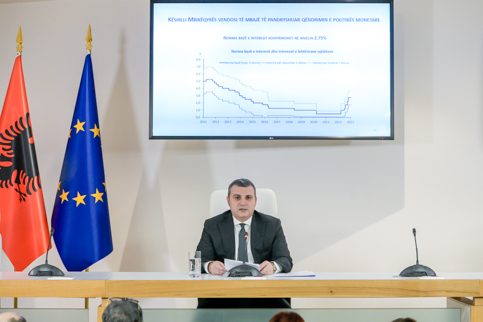BANK OF ALBANIA
PRESS RELEASE
Governor Sejko: Statement to the Press Conference on Monetary Policy Decision, 1 February 2023
Publication date: 01.02.2023
Dear Ladies and Gentlemen,
Today, on 1 February 2023, the Supervisory Council of the Bank of Albania reviewed and approved the Quarterly Monetary Policy Report.
The new information analysed in this Report has resulted, overall, better than our expectations. Inflation declined in November and December, economic activity continued to grow in the second half of year, while the normalisation effect of monetary policy stance is appearing more complete in financial markets.

These trends are expected to continue in the next quarters as well. In particular, the update of projections reaffirms our expectations that inflation will return to the target within the first half of 2024.
In light of the above, the Supervisory Council decided to maintain the monetary policy stance unchanged.
Nevertheless, the Supervisory Council concludes that inflationary pressures continue to remain elevated and the further normalisation of monetary policy stance in future is needed to guaranteeing the return of inflation to target.
Below, I will outline today's decision and explain in more detail the rationale behind it.

***
Inflation of consumer prices has trended downwards in the last two months of 2022. Inflation rate, after peaking at 8.3% in October 2022, declined at 7.4% as at end of year. In terms of basket, the decreased inflation rate reflected the drop in prices of oil and some food items, driven by the similar performance of these prices in the international market. On the other side, inflation rates of services and other items remain at high levels, comparable with those in previous months.
From the macroeconomic perspective, the decline in inflation reflected the reduction in the imported inflation, while the domestic inflationary pressures remain high. The latter are fed by the relatively strong demand for goods and services, the rapid increase in employment, wages and production costs, and the still high expectations of economic agents for inflation.
Economic activity in Albania continued to grow in the second half of 2022 as well. Economic growth accelerated at 4% in the third quarter, after the temporary slowdown a quarter earlier. In terms of sectorial contribution, the expanded activity in the sectors of construction and services underpinned the economic growth, while industrial activity contracted and agricultural production remained almost at the same level. On the demand side, economic growth was driven by the increased household’s consumption and private investments, whereas public sector and net foreign trade exchanges provided a decelerating effect.
Economic growth has been accompanied by an increase in employment and wages. Employment grew by 4.2%, unemployment rate fell to the new historical minimum of 10.6%, and the average wage in private sector expanded by 12.3% in the third quarter. The positive performance of labour market establishes the premises for a sustainable economic growth in the future, while it signals also a rapid increase in production costs and pressures on consumer prices.
Financial markets have been operating smoothly. Yields on Government's securities have manifested signs of correction and normalisation. The monetary policy normalisation has pushed up interest rates on deposits and bank loans in Albania and globally, though their level still remains simulating for the increase of consumption and investments. Therefore, credit to the private sector – despite slowing down- has continued to show positive monthly flows and a positive annual growth, in turn covering the needs of both enterprises and households for financial assets. In parallel, the exchange rate have posted appreciating trends against the main international currencies, due to high foreign exchange income and contained risk premia.
Our updated projections suggest inflation will fall gradually during 2023, and return to target in the first half of 2024. In parallel, the Albanian economy is expected to continue to grow while the main financial stability indicators are expected to remain under control.
The decline in inflation will reflect the further reduced inflation in international markets and the cumulative consequences of monetary policy stance normalisation in Albania. These consequences appear in the form of controlled expectations of market agents, sustained exchange rate and the better balance between the demand and aggregate supply in Albania.
Economic growth in Albania is expected to remain in positive territory, fuelled by: sound balance sheets of private sector; positive dynamics in labour market; reduced uncertainty; and a still accommodative financial environment. Nevertheless, economic growth is expected to slightly slow in 2023 and return to the historical growth momentum in both the medium and long term. This trend, mainly reflects the expected foreign demand dynamics and the action of base effect.
***
Based on these considerations, the Supervisory Council decided to:
- Keep the policy rate unchanged, at 2.75%;
- Keep the overnight lending rate unchanged, at 3.75%
- Keep the overnight deposit rate unchanged, at 1.75%.
The Supervisory Council re-affirms its assessment that the elevated inflationary pressures are the primary risk to the sustainable and long-term growth of the Albanian economy. In addition, the Supervisory Council emphasises that, based on the current information, the further normalisation of monetary policy stance remains necessary to safeguard our price inflation objective. In presence of a risk balance to inflation still on the upside, this normalisation turns even more necessary.
In line with the previous statements, the Supervisory Council highlights that the speed and intensity of this normalisation has been and will continue to be data-dependent. The monetary policy stance will aim at providing the necessary conditions to safeguard price stability objective in the medium term, simultaneously paying attention to minimise their impact on the economic activity.
The Supervisory Council will carefully monitor the inflationary pressure dynamics going forward, to identify in a timely manner the necessary measures for meeting the target.

 Linkedin
Linkedin
 Twitter
Twitter
 Youtube
Youtube
 Facebook
Facebook
 Flickr
Flickr
 RSS
RSS
 Subscribe
Subscribe
 Feedback
Feedback